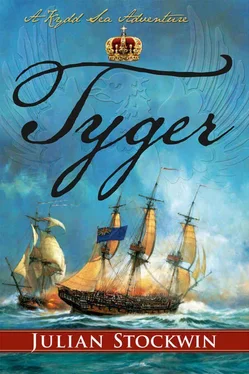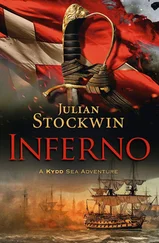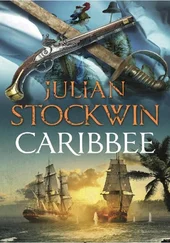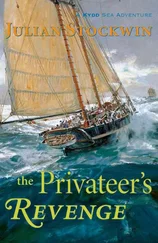“My lord, we have a guest tonight,” Essington said smoothly, “whom I’ve no doubt you’ve heard about in recent times. May I present-”
“No, let me guess,” Jervis interrupted gruffly, staring steadily at Kydd as he ate.
Nervously, Kydd wondered whether he should prompt the aged sailor.
“Ah, yes. Kydd with a y amidships, a Nelson eleve before Trafalgar, if my memory serves.”
“Why, yes, sir-”
“And a damned odd way of demanding a ship!”
Kydd reddened at the recollection of the muddle that had allowed him, as a post captain, to beseech the command of a lowly sloop. At the same time he glowed: the illustrious admiral remembered him! “I have to thank your lordship for your kindness.”
It seemed to mollify.
“You’ve seen service since, Kydd.”
“I’ve been fortunate, my lord.”
“You have. Curacao was a well-done thing, but where does it leave us? Another Caribbean liability for not much revenue.” Jervis reached out and poured more currant sauce dismissively.
Essington politely interjected: “Captain Kydd had a significant role in the conquest of Cape Colony, my lord.”
“Did he?” He looked at Kydd coldly. “Then he must have followed that damned popinjay Popham on his hare-brained and insubordinate adventure against Buenos Aires!”
“Yes, sir, I did.”
“For which the coxcomb must explain himself before a court-martial, hey?”
“My lord, do you not think there might have been circumstances that-”
“Sir, there is no conceivable state of affairs in creation that allows a junior commander to take it upon himself to leave his lawful station to go adventuring,” Jervis said acidly.
Kydd knew he should not press the matter with so fabled a figure but couldn’t help murmuring, “All the same, it does seem a hard thing to me that a man be punished for being active, when the safer is to do nothing.”
Jervis slammed down his fork and glared at him. “Are you trying to excuse the man’s actions? If so, you fall far short in my estimation, Mr Kydd!”
Kydd burned. “Commodore Popham thought to do his duty to the larger interests of Britain, which he saw-”
“How dare you lecture me, sir?” Jervis barked. “Are you to be counted in that poltroon’s camp? Then you’re sadly misguided! The Admiralty can brook no insolence from mercenary venturers such as he and they’ll show him no mercy when the verdict’s given.”
He leaned forward and, with a look of deadly intensity, went on quietly, “So have a care, Mr Kydd. If you shackle yourself to that mountebank I will not answer for your future. You understand me, sir?”
Afterwards Essington took Kydd aside. “That was not a wise thing in the circumstances, my dear fellow. He may now be retired but his word counts for much in the high councils.”
Kydd smiled ruefully. “I honour the old man with all my heart, but I’m persuaded there’s two sides to the business, and this being a social affair I thought I could-”
“St Vincent cares deeply for the staunch, true ways and will be merciless to those he sees failing to conform. You’re sailing close to the wind, my friend.”
The next day Kydd had other concerns, chief of which was the rendezvous to go riding with the winsome younger sister he had accompanied to the theatre, Miss Sophy.
He and Bazely had rented hacks, passable high-steppers, and Kydd was conscious of the fine figure he made as they cantered out to the broad perimeter roadway around Hyde Park, known as Rotten Row.
They were far from alone: there were carriages of every degree of opulence, tooling along with ladies twirling parasols as their beaus held the reins, weaving in and out of knots of dandies “on the strut” and promenading couples. Others passed by, their riders eyeing them to see if they were to be ignored or deferred to.
The sisters were waiting for them, sitting demurely side-saddle on matching brown mounts. The four set out together at a sedate walk, conversations light and gay. It was a perfect day and Kydd’s blood rose at the sight of the girl beside him in her fetching blue habit and prim chapeau .
“I do declare,” she said, with a pout, “it’s so perfectly unfair that you men do hold to yourselves all the excitement!”
“Why, what must you mean, Miss Sophy?” Kydd chuckled.
“You’re soon enough going back to the sea, to a great big ship searching for prey to fall upon, and after a huge battle you’ll take it, then come back to land with hatfuls of guineas in prize-and all the time your intended must wait alone for your return …”
“Ah,” Kydd said, aware of the prettiness of her downcast eyes. “The sea service does not always yield such, I’m persuaded. Have you not heard of storms and tempests? And what if the foe is bigger-what then?”
She looked up winningly. “The brave captain I see will not be dismayed by great odds!”
Bazely leaned over and said with a piratical chuckle, “Aye, this is true ’nuff. I’ve seen Tom Cutlass here stand with bloodied sword on his quarterdeck when all around-”
“Do stow it, Bazely, there’s a good fellow. I’ve a mind to enjoy myself. Where shall we victual, do you think?”
They finished the day with a promise of a visit to the races. If this was what he had to put up with while he waited for his new command, there were worse fates, Kydd mused.
But returning to the White Hart he found the post had brought a complication. The court-martial of Commodore Popham was to be held at HMS Gladiator in Portsmouth in three days’ time and his attendance as a witness was thereby required.
KYDD PENNED A QUICK NOTE to Bazely, then he and Tysoe took the next coach for Portsmouth. No doubt the business would be concluded in a few days and he could be back in Town. Unlike the protracted deliberations of a civil case, court-martial proceedings consisted of naval officers trying their peers. There would be no need for lengthy explanations and all would be judged in the stark light of the Articles of War. It was incontrovertible that Popham had left his station without orders. That alone was sufficient to condemn the man, whatever mitigating circumstances were brought before the court.
Kydd knew the road well and gazed through the window at the garden-like countryside passing by, idly considering possible future entertainments with Miss Sophy when his life of leisure resumed.
The prospect of the old naval port loomed and the coach clattered over Portsea Bridge and into the busy town. In the matter of accommodation the Star and Garter was for lieutenants, the Blue Posts for midshipmen, so Kydd would be lodging at the George, Nelson’s favourite.
It seemed unusually crowded and it was some minutes before he was attended to.
“Staying for the trial, sir?” the innkeeper asked, summoning a porter. Kydd was in plain brown dress but he’d clearly recognised the bearing of a naval officer. Without waiting for an answer, the man added, “Then you’ll be interested in the newspapers, sir. We have them all in the parlour for your convenience.”
While Tysoe saw to the unpacking, Kydd sat in the bow window for the sake of the light and picked up the Portsmouth Post . Although ostensibly just reporting the facts, there was malice behind the words. “The Trial of Sir Home Popham … upon the most serious charge of abandoning his station … the unfortunate failure of the unsanctioned enterprise … must now answer for it before his peers …” In three dense columns the writer had laid out the essentials. The article began with the British army’s near-run conquest and subsequent control of the Dutch-held Cape of Good Hope, at six thousand miles distance of England, leaving the victorious army in control but the Navy’s small squadron under Popham on guard against a vengeful counter-stroke.
Читать дальше









